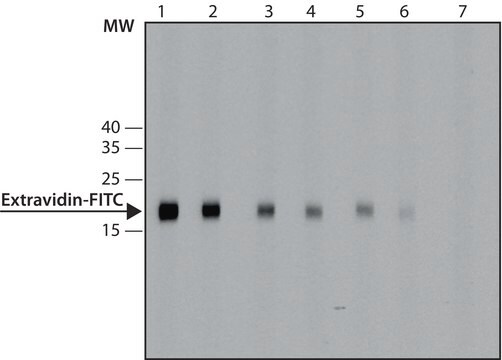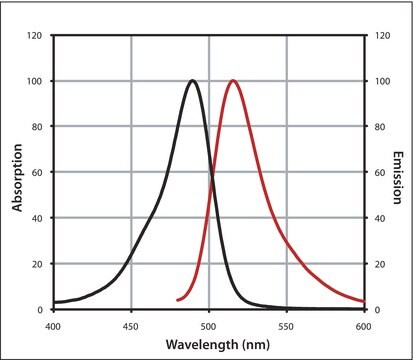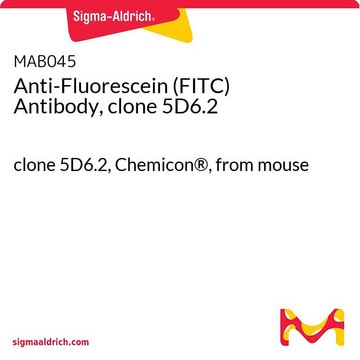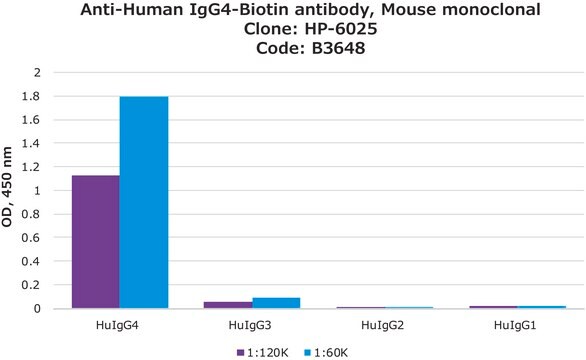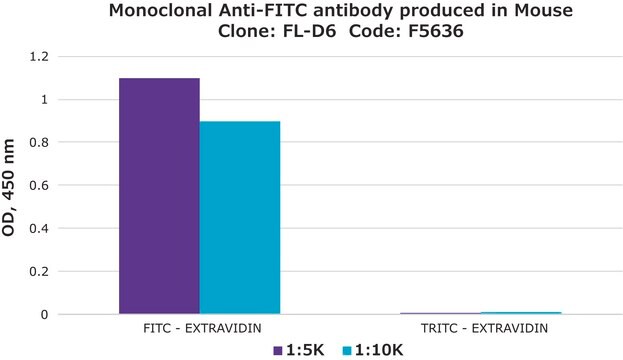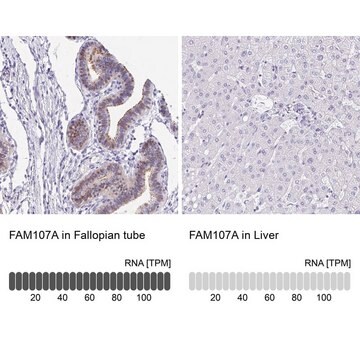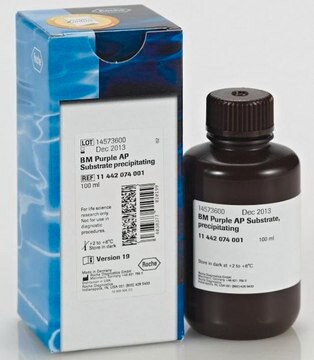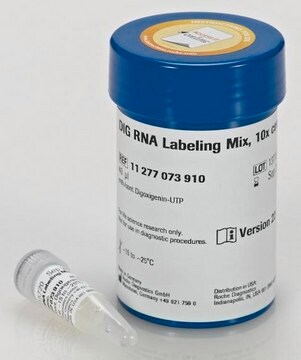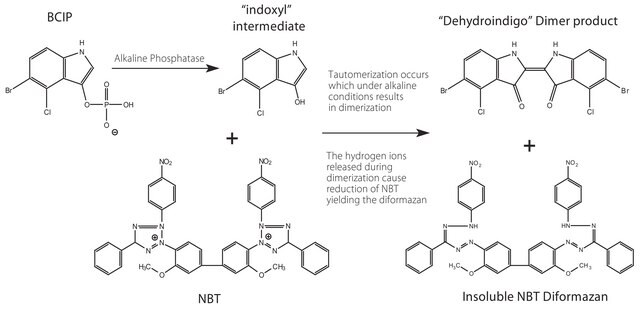11426338910
Roche
Anti-Fluorescein-AP, Fab fragments
from sheep
Synonym(s):
antibody
Sign Into View Organizational & Contract Pricing
All Photos(1)
About This Item
UNSPSC Code:
12352203
Recommended Products
biological source
sheep
Quality Level
conjugate
alkaline phosphatase conjugate
antibody form
affinity purified immunoglobulin
antibody product type
primary antibodies
clone
polyclonal
form
solution
packaging
pkg of 150 U (200 μl)
manufacturer/tradename
Roche
isotype
IgG
storage temp.
2-8°C
General description
Fluorescein is synthesized from m-dialkylaminophenols or resorcinols condensed with phthalic anhydrides under harsh conditions. Fab fragments bind to G proteins.
This gene encodes a member of the SOX (SRY-related HMG-box) family of transcription factors involved in the regulation of embryonic development and in the determination of the cell fate. The encoded protein may act as a transcriptional activator after forming a protein complex with other proteins. This protein acts as a nucleocytoplasmic shuttle protein and is important for neural crest and peripheral nervous system development. Mutations in this gene are associated with Waardenburg-Shah and Waardenburg-Hirschsprung disease. (provided by Ref Seq)
Specificity
The polyclonal antibody reacts with free and bound fluorescein.
Application
Use Anti-Fluorescein-AP, Fab fragments for the detection of fluorescein-labeled compounds using:
- Dot blot
- ELISA
- Immunohistocytochemistry
- In situ hybridization
- Southern blot
- Western blot
- Electrochemical biosensing technique for the detection of 16S rRNA
Biochem/physiol Actions
Anti-Fluorescein-AP, Fab fragments has been used in oligonucleotide capture, denaturation and detection (CDD).
Features and Benefits
Contents
Solution, stabilized
Solution, stabilized
Preparation Note
- Working concentration: The following concentrations depend on application and substrate and should be taken as a guideline. Dot blot: 150mU/ml
- ELISA: 150 to 300mU/ml
- Immunohistocytochemistry: 250 to 500mU/ml
- In situ hybridization: 1.5 to 7.5U/ml
- Southern blot: 150mU/ml
- Western blot: 250 to 500 mU/ml
Working solution: 100mM Tris-HCl, 150mM NaCl, pH 7.5. If necessary 1% Blocking reagent (w/v), dry milk powder, 1 to 5% heat inactivated fetal calf serum (v/v) or sheep normal serum can be used for reduction of unspecific binding.
Other Notes
For life science research only. Not for use in diagnostic procedures.
Not finding the right product?
Try our Product Selector Tool.
signalword
Warning
hcodes
Hazard Classifications
Skin Sens. 1
wgk_germany
WGK 1
flash_point_f
No data available
flash_point_c
No data available
Certificates of Analysis (COA)
Search for Certificates of Analysis (COA) by entering the products Lot/Batch Number. Lot and Batch Numbers can be found on a product’s label following the words ‘Lot’ or ‘Batch’.
Already Own This Product?
Find documentation for the products that you have recently purchased in the Document Library.
Customers Also Viewed
Applications And Engineering Of Monoclonal Antibodies (1998)
Simplified Paper Format for Detecting HIV Drug Resistance in Clinical Specimens by Oligonucleotide Ligation
Panpradist N, et al.
PLoS ONE (2016)
Nadia A Fernández-Santos et al.
PLoS neglected tropical diseases, 14(1), e0008008-e0008008 (2020-01-31)
All formerly endemic communities of the Southern Chiapas focus of onchocerciasis in Mexico were treated with ivermectin until parasite transmission was eliminated by 2015. Transmission of onchocerciasis did not resume during a period of three years (2012-2014) following the final
Fluorescent indicators for cytosolic calcium based on rhodamine and fluorescein chromophores
Minta A, et al.
The Journal of Biological Chemistry, 264(14), 8171-8178 (1989)
Mohammad Goudarzi et al.
Developmental cell, 43(5), 577-587 (2017-11-28)
Cell migration is essential for morphogenesis, organ formation, and homeostasis, with relevance for clinical conditions. The migration of primordial germ cells (PGCs) is a useful model for studying this process in the context of the developing embryo. Zebrafish PGC migration
Our team of scientists has experience in all areas of research including Life Science, Material Science, Chemical Synthesis, Chromatography, Analytical and many others.
Contact Technical Service

